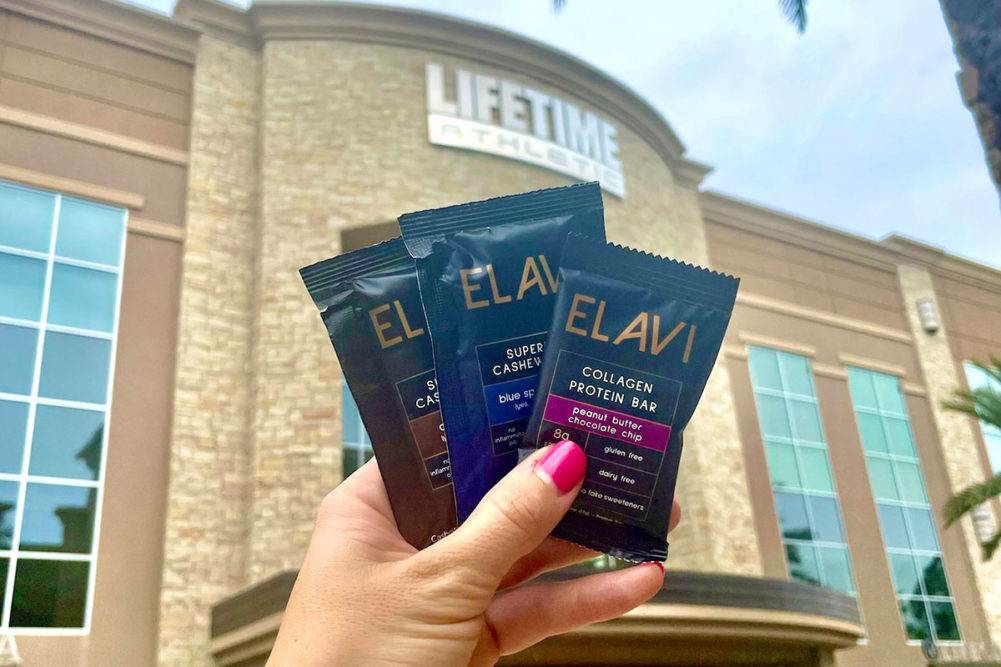KANSAS CITY — Fitness studios, cafes and clothing stores offer opportunities for emerging food and beverage brands to be discovered. Entrepreneurs should pursue such outlets when the setting aligns with the brand.
ELAVI, a Los Angeles-based snack startup founded by a pair of exercise instructors, recently launched its collagen protein bites and single-serve cashew butter packets at dozens of Life Time health clubs across the country. Co-founders Michelle Razavi and Nikki Elliott said the brand is part of a thoughtfully selected, wellness-driven assortment.
“Most grocery stores are massively overstocked with protein bars and nut butters,” Ms. Razavi said. “You kind of get lost in a sea of your competitors, whereas the fitness channels curate their products to only bring the best of the best, to reduce paralysis of decision making.”
Additionally, she noted, a frequent patron of a fitness center is likely not seeking discounts or deals, which benefits smaller-scale specialty players.
“In that moment when you’re hungry, you’ve just had a workout, or you need something really quickly, you’re not as price conscious,” Ms. Razavi said. “That’s been a great advantage, for us to play as a premium brand in a place where there isn’t as much price sensitivity or pressure to discount.”
Sampling products before and after group fitness classes at Life Time locations enables the founders to interact with target consumers and receive real-time feedback.
“Grocery stores … is more about getting people in and out whereas gyms and fitness studios want to curate an experience for their members, and we get to be a part of that experience,” Ms. Elliott said.
Grace Cheng, founder of Los Angeles-based Mylk Labs, described coffee shops as “prime real estate” for her brand’s grab-and-go oatmeal cups.
“What was great about it was there was no marketing effort that needed to be done on my end,” she said. “All the coffee shops have loyal customers … I’m sure there were a ton of people looking for vegan, gluten-free options. They’re never going to offer two oatmeal brands. I have no competition…
“When I got into it, I found out so quickly that this is how I’m going to grow my company. I stopped reaching out to grocery stores and just started with coffee shops. From coffee I moved on to hotels. From hotels I moved on to coworking. From coworking I moved on to corporate offices.”
Because shelf space is limited in such venues, landing a spot may prove challenging, and managing numerous accounts without brokers or distributors requires a lot of work. Still, the advantages are significant, Ms. Cheng said, citing higher margins, stronger relationships with her customers and complete visibility into her brand’s performance at each location. (Distributors don’t always provide reporting, so “if an account is doing terribly or discontinues your product, you have no idea,” she said).
Some apparel chains also stock specialty food brands near checkouts alongside other impulse items. Lauren Chew, founder and chief executive officer of San Francisco-based Love + Chew, recently tested her cookies at some Old Navy stores during a monthlong period for consideration for a national launch. Ultimately, the brand was not selected, and, she shared in a LinkedIn post, “the ‘better-for-you’ category in general did not perform well.”
The experience provided insight into her core consumer that will help her position the brand elsewhere, she said, adding, “Sometimes a partnership is not a fit, and it’s better to find out now rather than launch at 1,100 stores and then be cut later.”
Establishing and nurturing partnerships in alternative retail channels may help a young brand gain footing and exposure, while potentially avoiding broker and distributor fees or the slotting fees of traditional grocery outlets. Founders should identify the appropriate venue with the best offering to surprise and delight the right consumer who will keep coming back for more.



